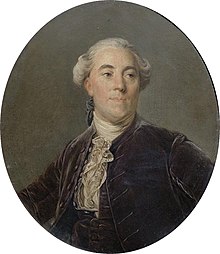
Back جاك نيكر Arabic جاك نيكر ARZ Жак Некер Bulgarian Jacques Necker Breton Jacques Necker Catalan Jacques Necker Czech Jacques Necker Danish Jacques Necker German Jacques Necker EE Ζακ Νεκέρ Greek
Jacques Necker | |
|---|---|
 Portrait by Joseph Duplessis, c. 1781 | |
| Chief Minister of the French Monarch | |
| In office 16 July 1789 – 3 September 1790 | |
| Monarch | Louis XVI |
| Preceded by | Baron of Breteuil |
| Succeeded by | Count of Montmorin |
| In office 25 August 1788 – 11 July 1789 | |
| Monarch | Louis XVI |
| Preceded by | Archbishop de Brienne |
| Succeeded by | Baron of Breteuil |
| Controller-General of Finances | |
| In office 25 August 1788 – 11 July 1789 | |
| Monarch | Louis XVI |
| Preceded by | Charles Alexandre de Calonne |
| Succeeded by | Joseph Foullon de Doué |
| Director-General of the Royal Treasury | |
| In office 29 June 1777 – 19 May 1781 | |
| Monarch | Louis XVI |
| Preceded by | Louis Gabriel Taboureau des Réaux |
| Succeeded by | Jean-François Joly de Fleury |
| Personal details | |
| Born | 30 September 1732 Geneva, Republic of Geneva |
| Died | 9 April 1804 (aged 71) Geneva, Léman, France |
| Spouse | |
| Children | Germaine Necker |
| Signature |  |
Jacques Necker (French: [ʒak nɛkɛʁ]; 30 September 1732 – 9 April 1804) was a Genevan banker and statesman who served as finance minister for Louis XVI. He was a reformer, but his innovations sometimes caused great discontent. Necker was a constitutional monarchist, a political economist, and a moralist, who wrote a severe critique of the new principle of equality before the law.[1]
Necker initially held the finance post between July 1777 and 1781.[2] In 1781, he earned widespread recognition for his unprecedented decision to publish the Compte rendu – thus making the country's budget public – "a novelty in an absolute monarchy where the state of finances had always been kept a secret."[3] Necker was dismissed within a few months. By 1788, the inexorable compounding of interest on the national debt brought France to a fiscal crisis.[4] Necker was recalled to royal service. His dismissal on 11 July 1789 was a factor in causing the Storming of the Bastille. Within two days, Necker was recalled by the king and the assembly. Necker entered France in triumph and tried to accelerate the tax reform process. Faced with the opposition of the Constituent Assembly, he resigned in September 1790 to a reaction of general indifference.
- ^ Craiutu, Aurelian (19 March 2018). A Voice of Moderation in the Age of Revolutions: Jacques Necker's Reflections on Executive Power in Modern Society (PDF). Ostrum Workshop Spring 2018 Colloquium. p. 6.
- ^ Peter Kropotkin (1909). "Chapter 5". The Great French Revolution, 1789–1793. Translated by N.F. Dryhurst. New York: Vanguard Printings.
- ^ de Staël, Germaine (2008). "Introduction". In Craiutu, Aurelian (ed.). Considerations on the Principal Events of the French Revolutions. Liberty Fund. pp. viii. ISBN 9780865977327 – via ProQuest Ebook Central.
- ^ Sargent, Thomas J.; Velde, Francois R. (June 1995). "Macroeconomic Features of the French Revolution" (PDF). The Journal of Political Economy. 103 (3): 481. doi:10.1086/261992.